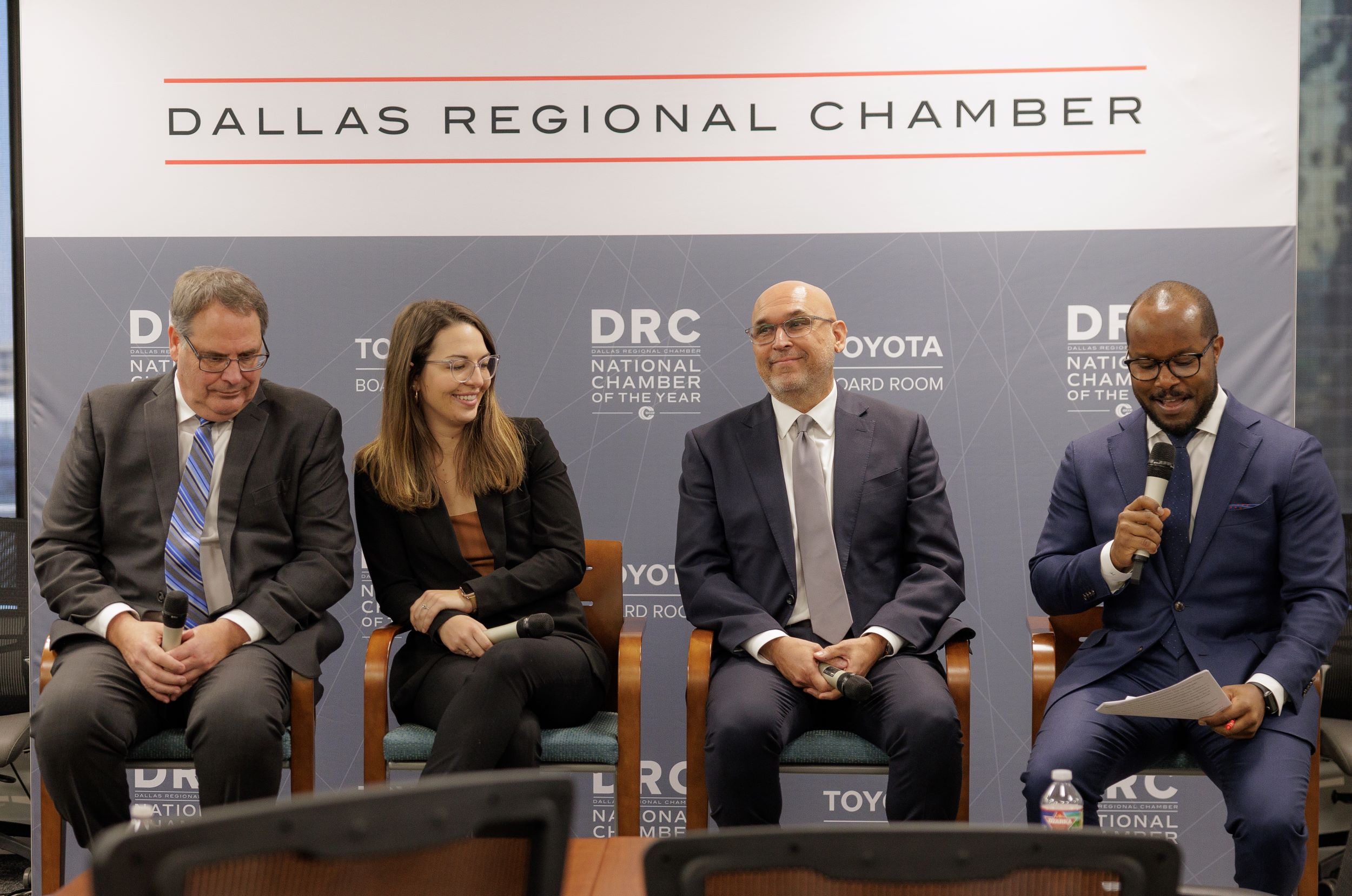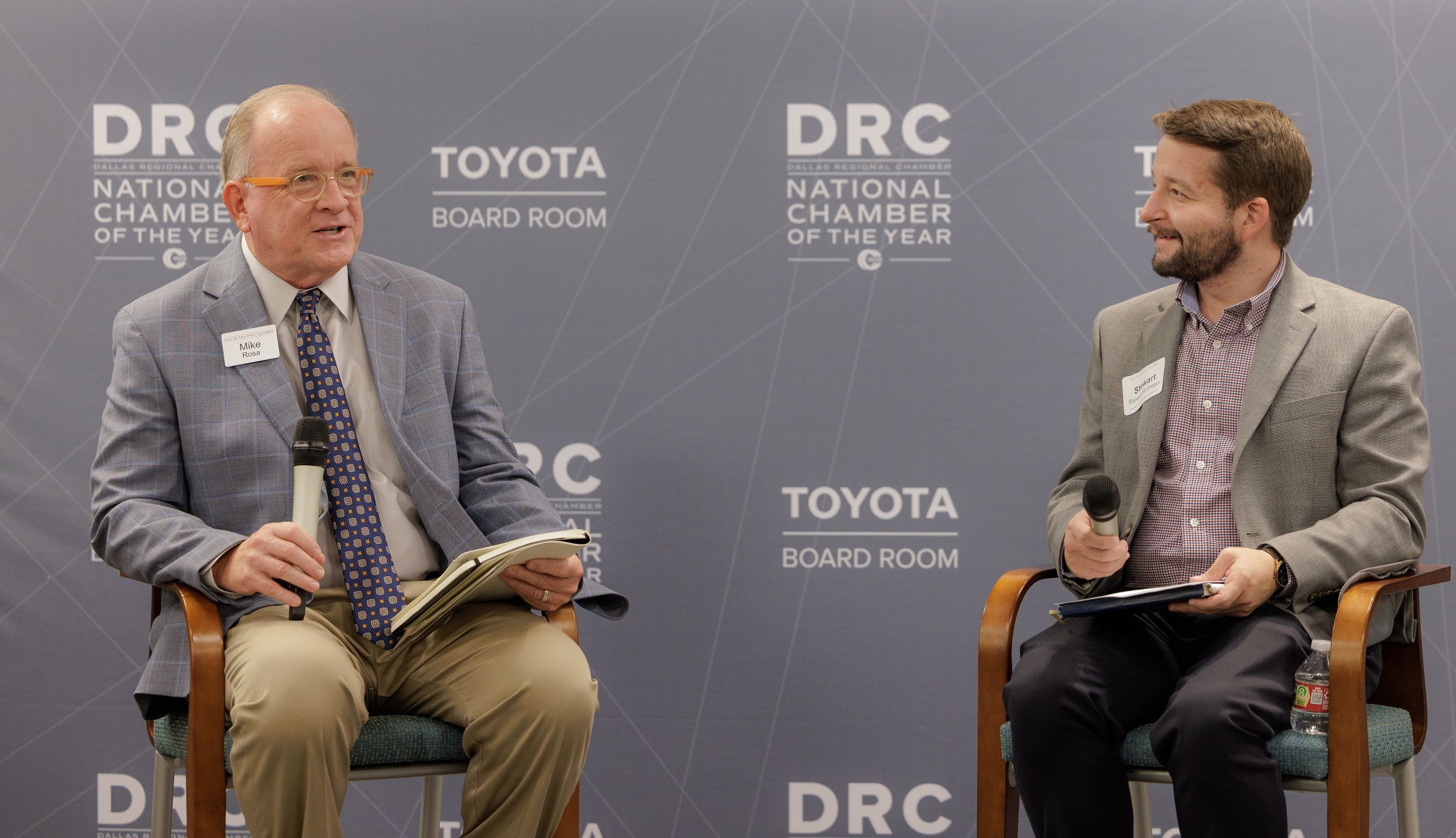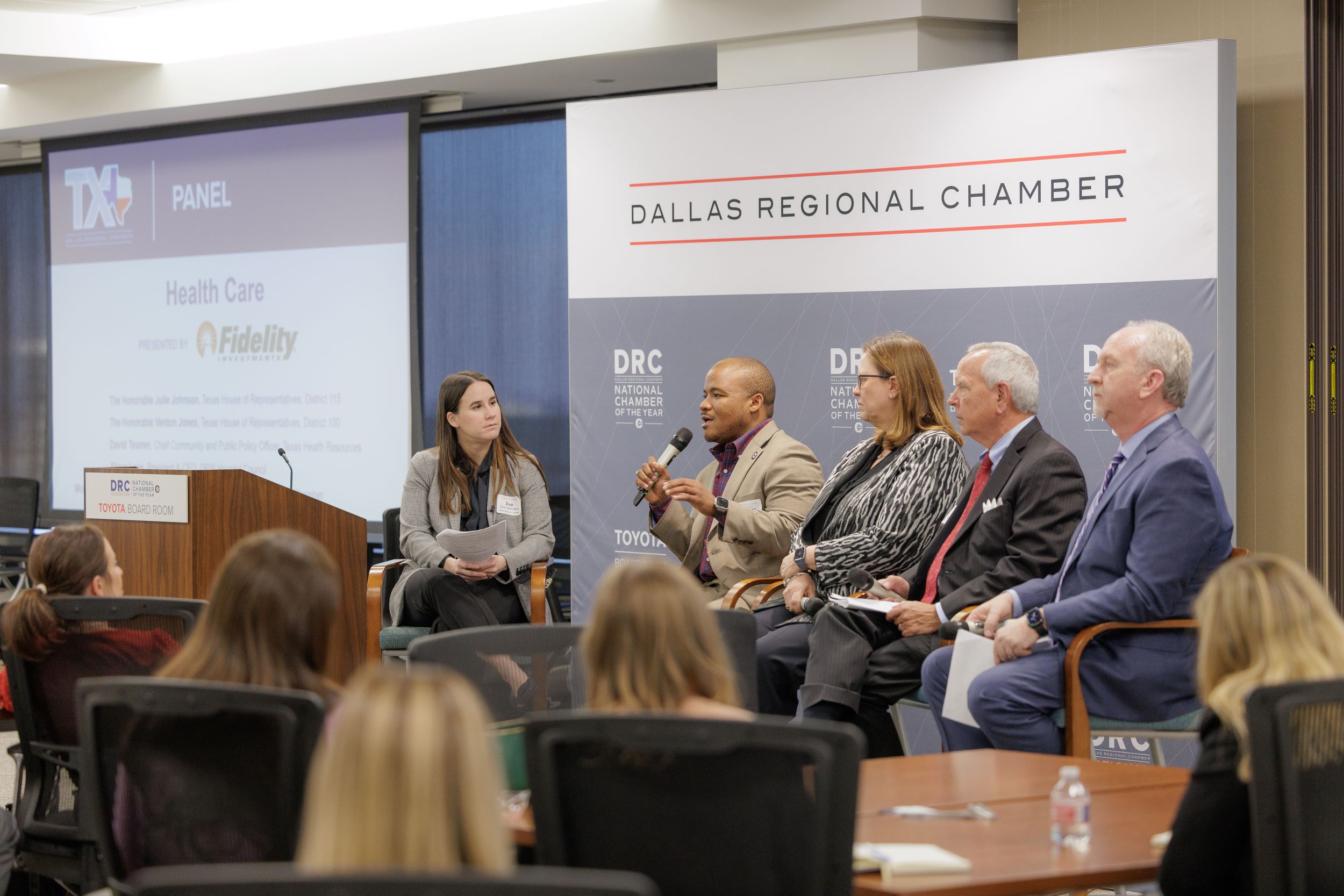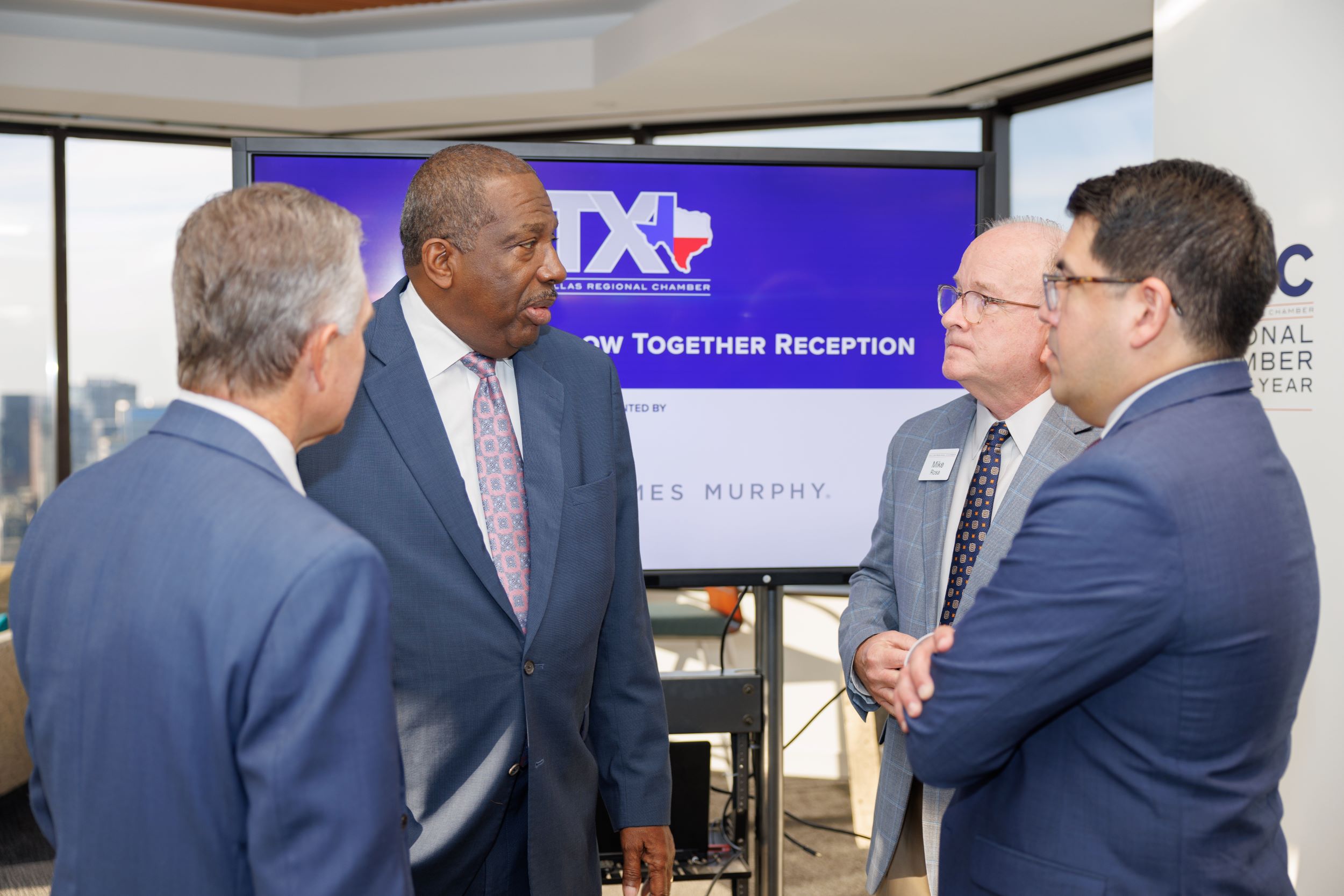By Catie George, Manager, Communications and Storytelling
The 88th Texas Legislative Session and four subsequent special sessions left a lot to cover at the Dallas Regional Chamber’s (DRC) Wrap-Up Event on Wednesday, Nov. 15. Takeaways from key policy areas were discussed by state and local officials and business and community leaders to give attendees an overview of all the work accomplished this year.

The event began with a luncheon focused on Education & Workforce, which discussed several key wins from the legislative session.
“The legislature invested $700 million into higher education. We had additional investments made in a new entity called the Texas University Fund, which will be a $3 billion endowment that will help emerging research universities achieve their goals and increase research at their respective systems,” said Dr. Mark Ruden, President of Texas A&M University-Commerce.
While there was much to celebrate, there is still progress to be made, especially regarding teacher pay.
“Compensation is one key piece of the puzzle. We have seen the desire to expand the teacher incentive allotment for educators in Texas. This is the program that allows Texas’s top third of teachers to be paid according to their impact on student learning,” said Kate Greer, Managing Director of Policy & State Coalition of The Commit Partnership. “This is a really powerful tool to reverse the trends we’ve seen, which is our highly effective, best teachers moving out of poverty-dense areas.”
However, panelists were hopeful for how education may fare in the next legislative session.
“In the future, it would be great to come away from a legislative session where we could say all of education, the entire spectrum of it, from early childhood through the twelfth grade and then to post-secondary, had a winning legislative session. And hopefully, we can do that in 2025,” said Texas Association of Community Colleges President Ray Martinez.

After the luncheon, a second panel focused on Economic Development.
“Here in Texas, locals lead the charge when it comes to economic development,” said Executive Director of the Kaufman Economic Development Corporation Stewart McGregor. “You go to other states, and it’s very much the top-down approach where the state is heavily involved in projects, making things come together and happen.”
Carlton Schwab, President and CEO of the Texas Economic Development Council, emphasized the importance of the local aspect of the Dallas Region’s economy in comparison to other places.
“Economic development is a decidedly local endeavor in our state,” said Schwab. “Our economic development success over the last four years was because of having really great locally elected leaders supporting economic development and great professionals in this state implementing economic development activities and programs on behalf of their communities,” like the passage of HB 5, which creates a new transparent and accountable statewide economic development incentive program.
The following Health Care panel began with a discussion on additional funding for the new behavioral health hospital serving the Dallas Region and operated by UT Southwestern. The multi-session project was originally funded by the 87th legislature but had to be revisited because of increased construction costs due to inflation. The current closest behavioral health hospital is in Terrell, over 35 miles east of Dallas. This new hospital will also help alleviate the current stress put on our healthcare systems by mental health patients.
“When we look at the amount of people who are incarcerated in Dallas County Jails right now, over half of those people are facing significant mental health challenges that led them to be incarcerated, and there are no services while they are incarcerated to help them address those issues,” said Representative Venton Jones. “So instead of putting people in prison beds, we’ll be putting them in hospital beds, providing them needed services.”

Equity in health care was a large focus of the panel.
“It’s one thing to have coverage, it’s another thing to have access, and we’ve got to work on it in a very balanced approach,” said Steve Love, President and CEO of the DFW Hospital Council.
Panelists agreed working through the issue of equity in health care means making it a clear priority in the legislature.
“Zip code is more important than your genetic code; where you live has everything to do with determining your health and well-being,” said David Tesmer, Chief Community and Public Policy Officer of Texas Health Resources. There are a lot of individuals in underserved communities that, if we provided coverage and access, would be able to buy food, to put gas in their cars. They’re making decisions now that say, ‘health care is number five or seven or eight on my list.’ Health care has to be an important part of this state’s priorities.”
Ultimately, health care is only going to be addressed if Texas lawmakers are encouraged by constituents to address it.
“If you want a healthier state, if you want access to health care, then you have to vote. Health care needs to be the issue you vote on,” said Representative Julie Johnson. “The business community is powerful. Your voices are meaningful, but you have to use them. And when you do use them, really good things can happen. You have such credibility; you have such opportunity and clout. You have access to political funding. You have all kinds of ways to influence the legislative process and the electoral process if health care is important enough to you.”
In the concluding Quality of Life panel, Senator Royce West and Dallas Police Department Lieutenant Julio Gonzalez discussed the new regional law enforcement training center that will be housed at UNT Dallas and the positive effects it will have on the Dallas Region.

“The fact of the matter is that we’re fortunate to have a better relationship now between law enforcement in Dallas and its citizenry,” said Senator West. “But we have to make certain that what’s going on in Dallas is duplicated around the state. We have to make certain that we continue to support law enforcement in Dallas and across the state.”
Lt. Gonzalez emphasized that having a regional facility will help improve standardization throughout the region and the state, to Senator West’s point.
“If you get pulled over in Burleson for a traffic violation, your experience with law enforcement should be roughly the same as if you get pulled over in Fort Worth or Dallas,” said Lt. Gonzalez. “When you have a regional academy providing training to various law enforcement agencies, it standardizes the training, and that’s important to the community.”
At the end of the half-day event, Senator West was presented with a Building Tomorrow Together award. Usually reserved for businesses, the award recognizes the positive impact he has had on economic development and his service to the Dallas Region.
Thank you to our Education & Workforce Luncheon sponsor, PNC Bank; our panel discussions sponsor, Fidelity Investments; our Building Tomorrow Together Reception sponsor, Holmes Murphy; and our silver sponsor, Haynes and Boone.
To learn more about the Public Policy work the DRC is doing, visit our website.